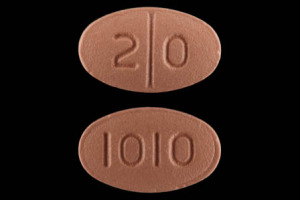Citalopram Dosage
Medically reviewed by Drugs.com. Last updated on Aug 26, 2025.
Applies to the following strengths: 10 mg/5 mL; 10 mg; 20 mg; 40 mg; 30 mg
Usual Adult Dose for:
Usual Geriatric Dose for:
Additional dosage information:
Usual Adult Dose for Depression
Initial dose: 20 mg orally once a day
Maintenance dose: 20 to 40 mg orally once a day
Maximum dose: 40 mg orally per day
Comments:
- The initial dose may be increased if necessary to 40 mg once a day after at least 1 week of therapy.
- Doses of 60 mg/day did not demonstrate an advantage in efficacy over 40 mg/day doses.
- Acute episodes of depression may require several months or more of sustained pharmacologic therapy
Use: Treatment of depression
Usual Geriatric Dose for Depression
Over 60 years of age:
Recommended dose: 20 mg orally once a day
Comments:
- Doses of 60 mg/day did not demonstrate an advantage in efficacy over 40 mg/day doses.
- Acute episodes of depression may require several months or more of sustained pharmacologic therapy.
Use: Treatment of depression
Renal Dose Adjustments
Mild to Moderate Renal Dysfunction: No adjustment recommended
Severe Renal Dysfunction: Use with caution
Liver Dose Adjustments
Liver dysfunction:
- Usual dose: 20 mg orally once a day
Dose Adjustments
Poor CYP450 2C19 metabolizers:
Recommended dose: 20 mg orally once a day
Concomitant therapy with cimetidine or another CYP450 2C19 inhibitor:
Recommended dose: 20 mg orally once a day
Treatment withdrawal:
- A gradual dose reduction is recommended instead of abrupt cessation where possible
- If intolerable symptoms occur, it is recommended to consider resuming the previously prescribed dose and to decrease the dose at a more gradual rate.
Switching between MAOI and citalopram therapy: At least 14 days should elapse between ceasing one of these medicines and starting the other.
Precautions
US BOXED WARNING:
- Antidepressants increased the risk compared to placebo of suicidal thinking and behavior (suicidality) in children, adolescents, and young adults in short-term studies of major depressive disorder (MDD) and other psychiatric disorders. Anyone considering the use of this drug or any other antidepressant in a child, adolescent, or young adult must balance this risk with the clinical need.
- Short-term studies did not show an increase in the risk of suicidality with antidepressants compared to placebo in adults beyond age 24; there was a reduction in risk with antidepressants compared to placebo in adults aged 65 years and older.
- Depression and certain other psychiatric disorders are themselves associated with increases in the risk of suicide. Patients of all ages who are started on antidepressant therapy should be monitored appropriately and observed closely for clinical worsening, suicidality, or unusual changes in behavior.
- Families and caregivers should be advised of the need for close observation and communication with the prescriber.
This drug is not recommended for use in children.
Consult WARNINGS section for additional precautions
Dialysis
Data not available
Other Comments
Administration advice:
- This drug should be taken as a single daily dose in the morning or evening; the dose may be taken without regard to meals.
General:
- Dosage should be adjusted based upon individual patient response.
- Treatment should be re-evaluated at regular intervals.
Monitoring:
- Cardiovascular: ECG monitoring (in patients with risk factors for QT interval prolongation)
- Metabolic: Hyponatremia, hypokalemia, hypomagnesemia
- Nervous system: Serotonin syndrome
- Psychiatric: Emergence or worsening of depression, suicidal thoughts or behavior, and/or any unusual changes in mood or behavior
Patient advice:
- Tell your healthcare provider about all of the medicines that you take, including prescription and non-prescription medicines.
- This medicine may increase the risk of suicidal thoughts and behavior. Be alert for the emergence or worsening of any symptoms of depression, any unusual changes in mood or behavior, or the emergence of suicidal thoughts, behavior, or thoughts about self-harm. Report any behavior of concern to your healthcare provider as soon as possible.
- This medicine may cause drowsiness and dizziness; do not drive a car or operate dangerous machinery until you know how this drug affects you.
- Do not drink alcohol or take other medicines that may cause sleepiness or dizziness while taking this medicine until you talk to your healthcare provider.
Frequently asked questions
- SSRIs vs SNRIs - What's the difference between them?
- What is the difference between Celexa and Lexapro?
- What are some common side effects of antidepressants?
More about citalopram
- Check interactions
- Compare alternatives
- Pricing & coupons
- Reviews (2,237)
- Drug images
- Side effects
- Patient tips
- During pregnancy
- Support group
- Drug class: selective serotonin reuptake inhibitors
- Breastfeeding
- En español
Patient resources
Other brands
Professional resources
- Citalopram monograph
- Citalopram Capsules (FDA)
- Citalopram Oral Solution (FDA)
- Citalopram Tablets (FDA)
Other brands
Related treatment guides
See also:
Further information
Always consult your healthcare provider to ensure the information displayed on this page applies to your personal circumstances.


